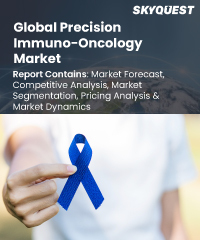
Report ID: SQMIG35H2063

Report ID:
SQMIG35H2063 |
Region:
Global |
Published Date: July, 2024
Pages:
157
|
Tables:
121 |
Figures:
77
Globally, The precision immuno-oncology market is primarily dominated by North America, which can be attributed to factors such as high healthcare expenditure, favorable reimbursement policies, and a large patient population.
However, the Asia Pacific region is projected to emerge as the fastest-growing market in the near future. This growth can be attributed to several factors, including the increasing prevalence of cancer, growing healthcare infrastructure, and rising demand for advanced cancer treatments. The Asia Pacific region also has a large population base, which presents a significant opportunity for market growth in the coming years.
Our industry expert will work with you to provide you with customized data in a short amount of time.
REQUEST FREE CUSTOMIZATIONWant to customize this report? This report can be personalized according to your needs. Our analysts and industry experts will work directly with you to understand your requirements and provide you with customized data in a short amount of time. We offer $1000 worth of FREE customization at the time of purchase.

Report ID: SQMIG35H2063